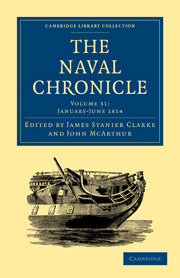 The Naval Chronicle
The Naval Chronicle Book contents
- Frontmatter
- PLATES IN VOLUME XXXI
- PREFACE TO THE THIRTY-FIRST VOLUME
- BIOGRAPHICAL MEMOIR OF ADMIRAL ROBERT BLAKE
- BIOGRAPHICAL MEMOIR OF ALEXANDER FRASER, ESQ. REAR-ADMIRAL OF THE WHITE SQUADRON
- BIOGRAPHICAL MEMOIR OF SIR GEORGE YOUNG, KNT. ADMIRAL OF THE WHITE
- BIOGRAPHICAL MEMOIR OF JAMES ALEXANDER GORDON, CAPTAIN R. N.
- INDEX
BIOGRAPHICAL MEMOIR OF JAMES ALEXANDER GORDON, CAPTAIN R. N.
Published online by Cambridge University Press: 10 January 2011
- Frontmatter
- PLATES IN VOLUME XXXI
- PREFACE TO THE THIRTY-FIRST VOLUME
- BIOGRAPHICAL MEMOIR OF ADMIRAL ROBERT BLAKE
- BIOGRAPHICAL MEMOIR OF ALEXANDER FRASER, ESQ. REAR-ADMIRAL OF THE WHITE SQUADRON
- BIOGRAPHICAL MEMOIR OF SIR GEORGE YOUNG, KNT. ADMIRAL OF THE WHITE
- BIOGRAPHICAL MEMOIR OF JAMES ALEXANDER GORDON, CAPTAIN R. N.
- INDEX
Summary
“Bydand.”
All men of sense reject unmeasur'd praise;—
Its sure effect—to sink where it would raise.
By noble minds, the parasite is scorn'd,
And splendid deeds—shine most when unadorn'd.
—Editor.The officer whose memoirs we are about to lay before our readers, though young in years, is old in renown, and has seen a great deal of very severe and active service. The motto of the Gordon crest is perfectly applicable to the fame he has already acquired; and were he, like the subject of our last memoir, no longer an inhabitant of this world, we should express with greater freedom our opinion of his imputed fine qualities and eminent exploits.
James Alexander Gordon was born in the year 1782. He went to sea at a very early age, when the revolutionary war with France first broke out. With the name of the ship in which he first served, we are unacquainted; but one of the earliest engagements in which he took part was the ever-memorable actions of the 29th May, and 1st of June, 1794, under Lord Howe; on which occasion he served in his Majesty's ship Glory, Rear-admiral Bowyer. He had also the good fortune to be present on the 27th of February, 1797, when the gallant Earl of St. Vincent so entirely defeated the Spanish fleet: on this occasion he served in the Goliath, with Captain (now Vice-Admiral) Thomas Foley, and distinguished himself greatly, giving proofs of what his country might expect from his future services.
- Type
- Chapter
- Information
- The Naval ChronicleContaining a General and Biographical History of the Royal Navy of the United Kingdom with a Variety of Original Papers on Nautical Subjects, pp. 353 - 512Publisher: Cambridge University PressPrint publication year: 2010First published in: 1814


